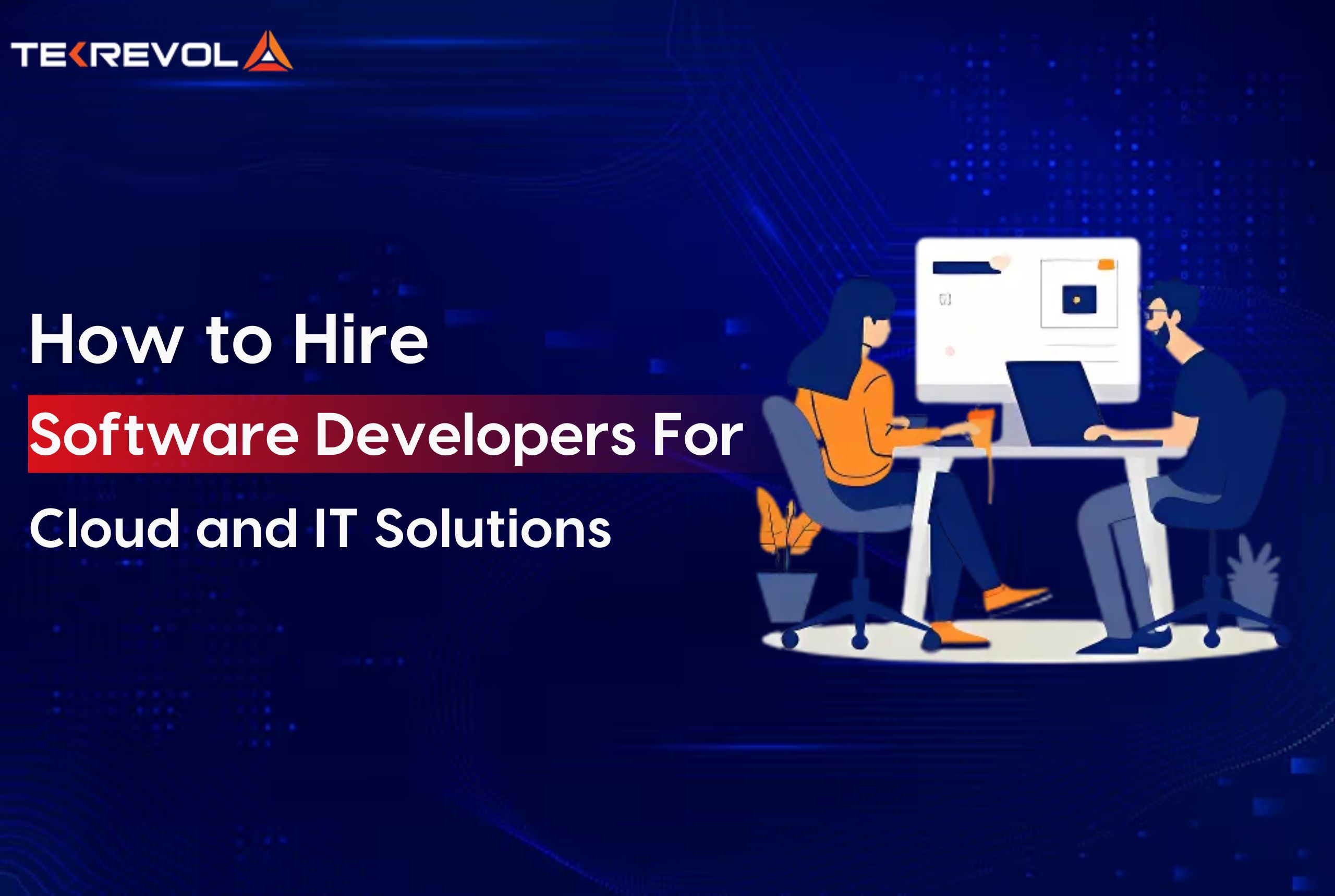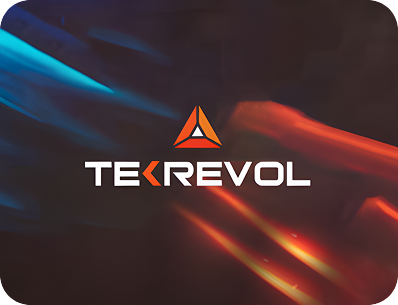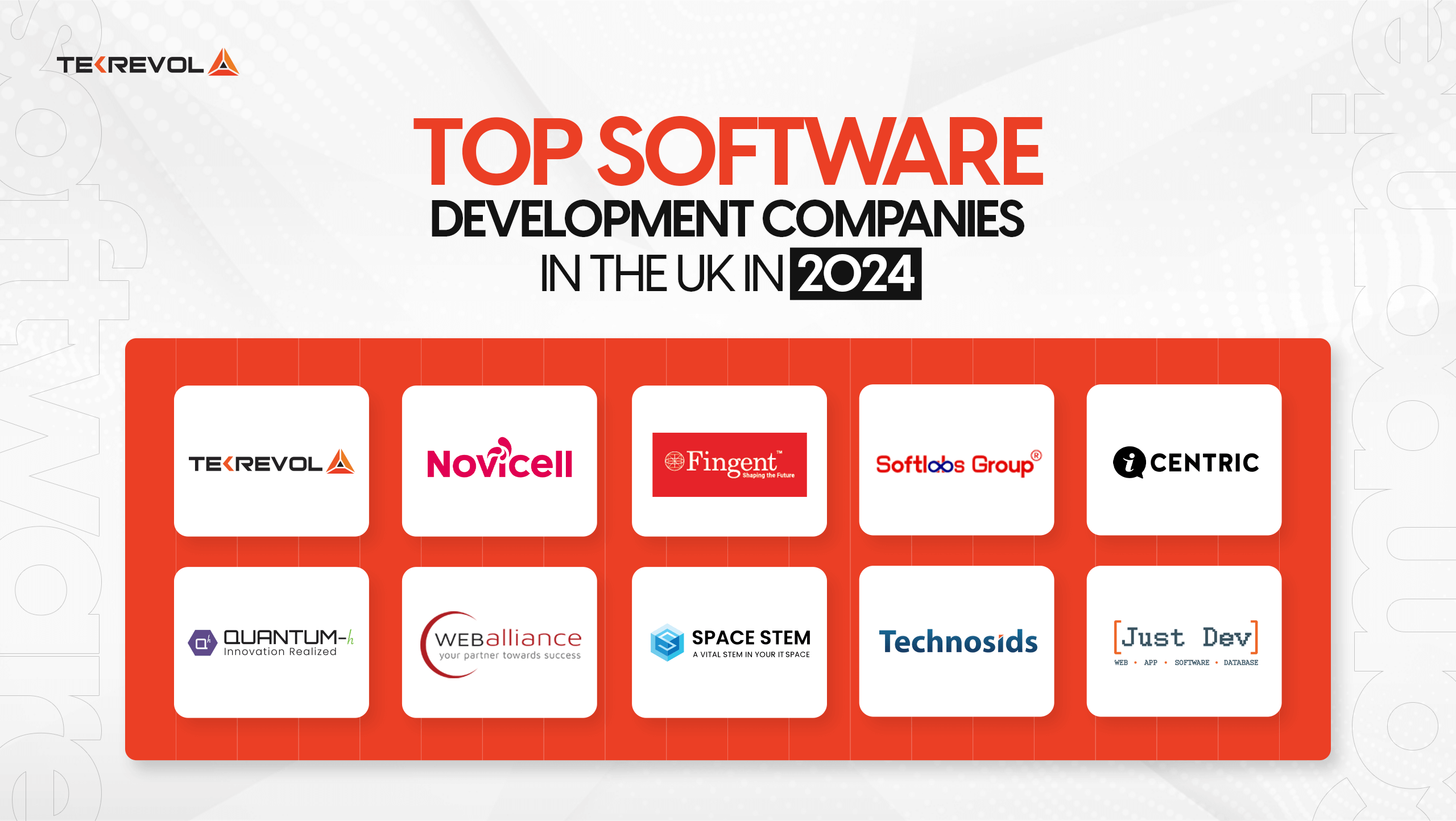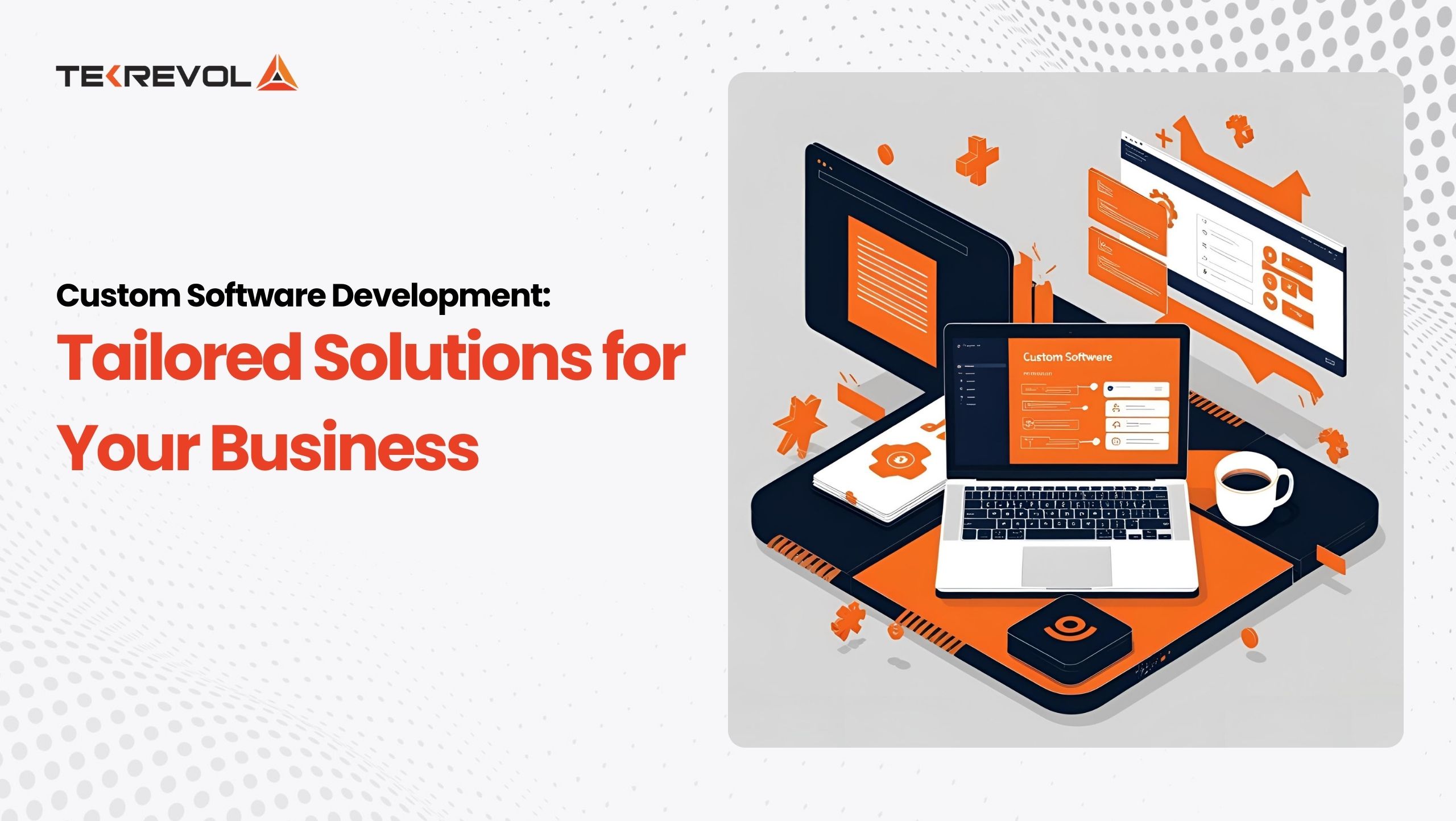Hiring the right talent for cloud and IT solutions isn’t easy. Every business is chasing that ideal mix of technical skills, real-world experience, and strategic insight, but finding it can be tough & where things get tricky.
You need software developers who don’t just code, they know how to keep systems secure, fast, and ready for anything. And that’s exactly what this blog is about: how to hire the right software developers for the job.
Whether building in-house or hiring a custom software development company, focus on talent that turns your infrastructure into an asset.
In this article, we’ll outline how to identify and source top talent able to form a team that’s adaptable, skilled, and aligned with your long-term objectives.
Top Skills to Look for When Hiring Software Developers for Cloud & IT Solutions
The right checklist for hiring should go beyond a person’s technical abilities. Consider these tips when looking for a custom software development company or cloud and IT solution experts to work for you remotely:
1. Cloud Platform Expertise
Ensure the developer has hands-on experience with major cloud platforms like:
- AWS
- Microsoft Azure
- Google Cloud Platform (GCP)
They are expected to know how to set up, launch, and scale apps on the cloud using EC2, Lambda, S3, Cloud Functions, or Azure DevOps.
2. Programming Proficiency
Select developers who are fluent in the languages and frameworks that support your project, including:
- Python, Java, Node.js, or Go for backend development
- React, Angular, or Vue for the frontend if needed
- Bash or PowerShell for scripting and automation
3. Experience with DevOps Tools
Your ideal candidate should understand DevOps workflows and tools, including:
- CI/CD pipelines (Jenkins, GitHub Actions, GitLab CI)
- Containerization (Docker, Kubernetes)
- Monitoring and logging (Prometheus, Grafana, ELK Stack)
This ensures smooth deployments and efficient system management.
4. Infrastructure as Code (IaC) Knowledge
Ensure that they are acquainted with IaC tools such as:
- Terraform
- AWS CloudFormation
- Ansible
These are used to automate infrastructure deployment and minimize human mistakes.
5. Security-First
Ensuring security is essential for cloud and IT developers throughout the design and construction phases. Check for:
- Understand cloud security best practices
- Acquaintance with IAM roles and permissioning
- Practical experience configuring firewalls, encryption, and secure APIs
6. Scalability and Performance Optimization
They should have knowledge of:
- Designing distributed systems
- Set up auto-scaling and load balancing
- Tune system performance and resource efficiency
These are crucial to enable your solution to scale up with demand.
7. Troubleshooting and Problem-Solving
Inquire about their previous experience managing:
- System failures
- Cloud infrastructure debug issues
- Performance bottlenecks
Analytical skills are not negotiable for mission-critical IT projects.
8. Team Collaboration and Good Communication
Cloud and IT projects are commonly carried out using cross-functional teams. Make sure the developer is able to:
- Collaborate with DevOps, security, and QA teams
- Communicate technical decisions to stakeholders
- Document code and system architecture in an understandable manner
9. Certifications (Optional but Helpful)
Though not required, relevant certifications bring credibility:
- AWS Certified Developer / Solutions Architect
- Microsoft Azure Developer Associate
- Google Professional Cloud Developer
10. Long-Term Availability & Support Mindset
Cloud and IT solutions need to be supported continually. Ensure the developer or software development team:
- Provides maintenance and monitoring
- Is accessible for updates and scalability enhancements
- Can sustain post-deployment stages
- Need expert help to modernize your IT systems?
- Hire our team of cloud professionals and move forward with confidence.
Best Practices for Hiring Software Developers for IT & Cloud Solutions
It is important for software developers to understand how to make cloud and IT infrastructure scalable, secure and innovative. This is how you select the most qualified people for a job.
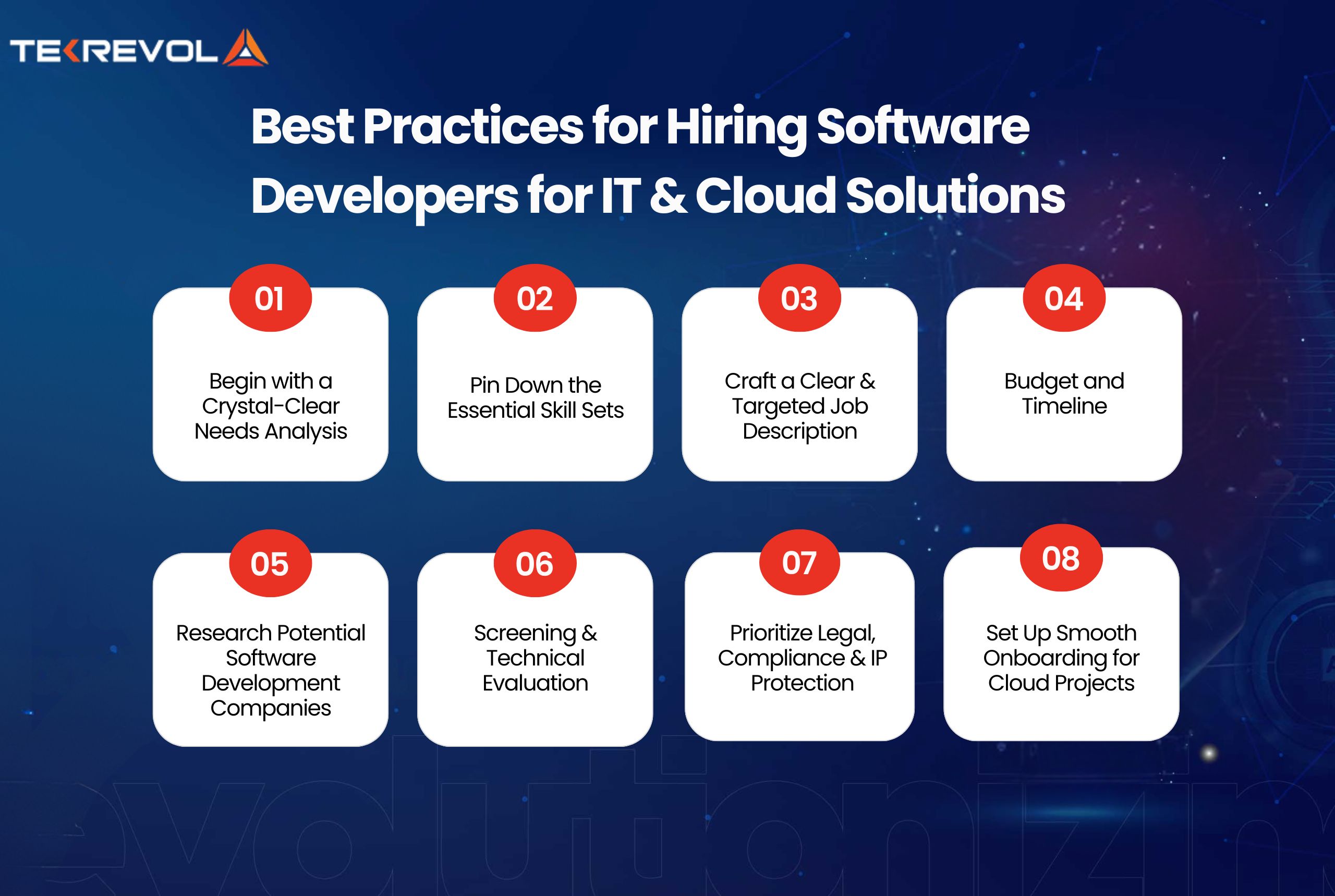
1. Begin with a Crystal-Clear Needs Analysis
Make sure you fully understand the project you want to complete before engaging a custom mobile software development company or individual developers.
- Project Type: Are you creating a fresh cloud-native application, refactoring old systems, or merely moving infrastructure? Every scenario calls for using different skills and members in the team.
- Technology Stack: Determine which cloud providers (AWS, Azure, GCP) and DevOps tools (Docker, Kubernetes, Terraform, Jenkins) you’ll employ.
- Compliance & Security Requirements: Are there compliance requirements like HIPAA, GDPR, or other sector-based regulations you need to follow? You will benefit from developers who have worked previously in regulated settings and will steer you clear of expensive errors.
2. Pin Down the Essential Skill Sets
Developing cloud software requires hiring individuals with more than standard coding experience.
Core Technical Skills
- Cloud Architecture: Familiarity with serverless functions, microservices, and container orchestration.
- Infrastructure as Code (IaC): Hands-on experience with Terraform, AWS CloudFormation, or Pulumi is vital for large-scale cloud deployment.
- CI/CD Pipelines: Hands-on experience with GitHub Actions, Jenkins, or CircleCI for continuous integration and deployment.
Complementary Skills
- Security Knowledge: Familiarity with cloud-native security (IAM roles, encryption, secret management).
- Cost Optimization: Skills in designing cost-efficient architectures and utilization of budgeting tools such as AWS Cost Explorer.
- Soft Skills: Cloud developers tend to collaborate cross-functionally. Seek individuals who are able to communicate efficiently and operate independently in distributed teams.
3. Craft a Clear & Targeted Job Description
Writing a clear, detailed job description is key to hiring the right cloud and IT developers. Focus on outlining the role, required skills, and desired experience.
Here’s an example for a Software Developer role:
| Key Responsibilities | Required Skills | Preferred Skills |
| Design and implement cloud-native applications. | Proficiency in Python, Java, or Go. | Experience with AWS Lambda, Google Cloud Functions. |
| Manage CI/CD pipelines and DevOps workflows. | Familiarity with Docker and Git. | Knowledge of Jenkins, GitHub Actions, or GitLab CI. |
| Monitor system performance and troubleshoot issues. | Experience with cloud monitoring tools (e.g., CloudWatch, Azure Monitor). | Understanding of cost optimization in cloud environments. |
| Collaborate with cross-functional teams to align with IT goals. | Strong communication and problem-solving skills. | Agile/Scrum project experience. |
4. Budget and Timeline
A firm budget and reasonable timeline are critical to the success of cloud and IT development projects, particularly when hiring a software development company.
- Define Your Budget Range: Set how much you are going to spend according to project scale, developer skill, and location.
- Request Detailed Estimates: A good development firm will give a detailed cost breakdown for design, development, testing, deployment, and support after launch.
- Align on Timeline Expectations: Plan out project milestones, delivery phases, and potential risks early on to prevent delays.
- Buffer for Changes: Always leave 10–20% extra time and budget for unanticipated changes or feature requests.
5. Research Potential Software Development Companies
Before browsing through job openings or hiring recruits, conduct extensive research on trustworthy software development companies equipped with an extensive talent pool for cloud and IT solutions.
Here’s what to search for:
- Industry Experience: Preferably choose those companies that have experience with cloud-based applications, IT infrastructure services, or DevOps automation for your industry.
- Technical capabilities: Check if their tech stack is appropriate for your needs like AWS or Azure, GCP, Kubernetes, or microservices architecture.
- Portfolio and case studies: look for projects concerning the respective area that they have successfully completed.
- Client testimonials and reviews: Reviews from third-party sites like Clutch, GoodFirms, or G2 can provide an idea of their support, communication, and reliability.
- Engagement Models: Make sure they have flexible models for hiring, such as fixed-price, time and material, or dedicated teams that could suit your project budget and scope.
6. Screening & Technical Evaluation
After you’ve got candidates, assess technical and cultural fit in depth.
Resume & Profile Screening
- Search for hands-on cloud experience, open-source contributions, and certifications (AWS Certified Developer, Azure Solutions Architect).
- Shipped project evidence and active GitHub repositories are a positive indicator.
Technical Assessments
- Give them small, real-world tasks (e.g., create a CI/CD pipeline or design a scalable cloud architecture).
- Have whiteboard sessions to evaluate problem-solving strategies.
Behavioral Interviews
- Discuss their history with system breakdowns, migration projects, and strategies they’ve used to cut costs.
- Get to know their working style and how they deal with pressure or uncertainty.
7. Prioritize Legal, Compliance & IP Protection
When outsourcing to a software development firm or working with remote developers, the safeguard of your data and intellectual property is not up for debate.
- Sign IP Agreements and NDAs: Make sure your development partner formally agrees, via a well-defined contract, that all code and IP rights belong to your company.
- Adhere to Compliance Standards: Verify the vendor’s cloud offerings comply with data residency regulations and security policies specific to your area.
- Define Roles in Contracts: Set out specific responsibilities and expectations in a written contract with the software company.
8. Set Up Smooth Onboarding for Cloud Projects
Bringing developers or a software agency on board calls for a structured onboarding process to ensure consistent speed and quality.
- Share Complete Documentation: Share architecture diagrams, API information, and credentials securely.
- Use Role-Based Access Control (RBAC): Only grant the access required for the developer’s role.
- Start with Quick Wins: Begin with small tasks early on to get new developers productive as soon as possible.
Different Engagement Models to Hire a Software Developer
When intending to develop or maintain cloud or IT solutions, it is important to select an appropriate hiring model for your project’s success. The most popular models to hire software developers are as follows:
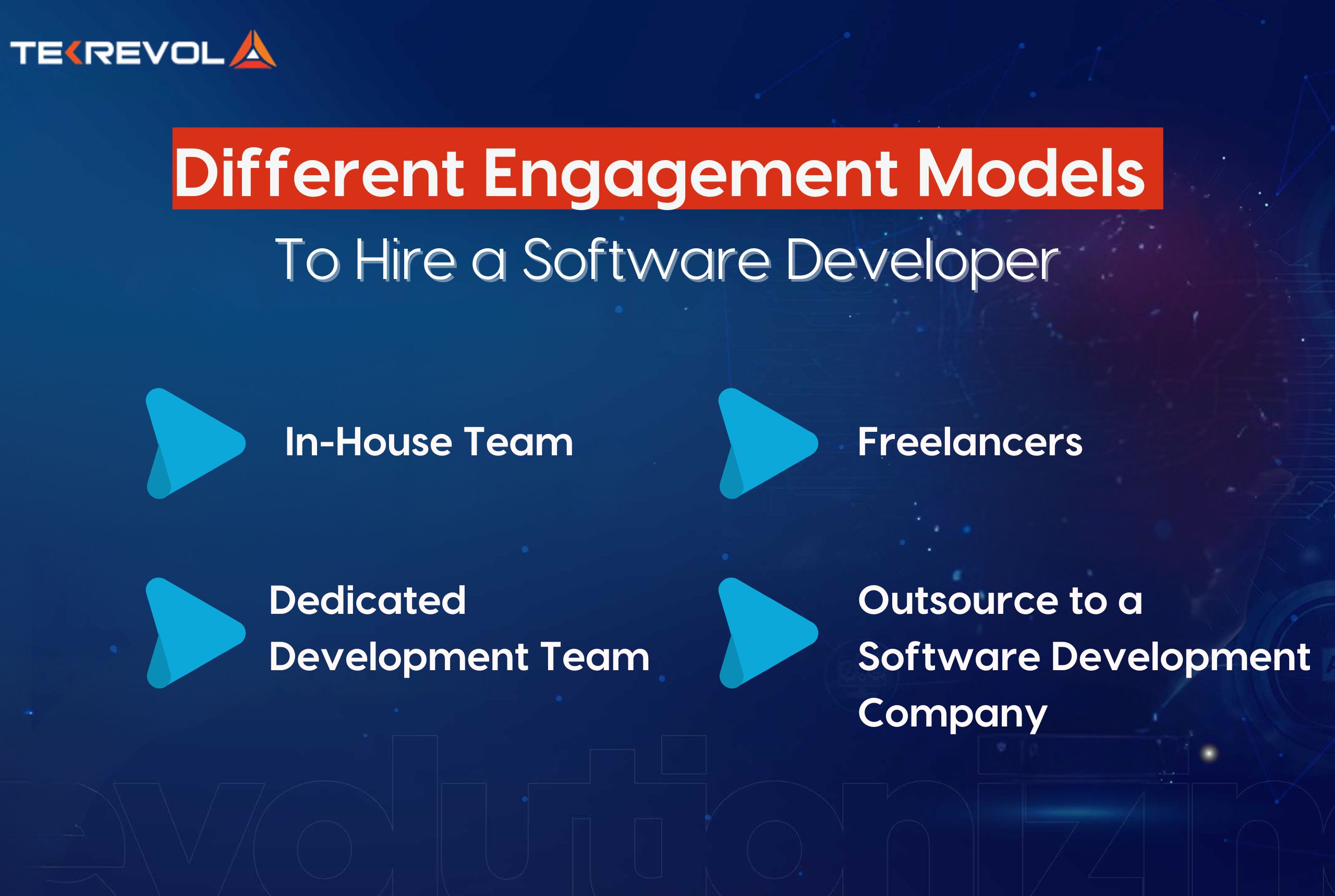
1. In-House Team
Recruit full-time developers who exclusively work for your organization. This model provides increased control, collaboration among team members, and long-term dedication at a higher cost of recruitment, training, and overheads.
Ideal for: Large-scale projects involving in-depth integration with your in-house systems and company culture.
Pros:
- Complete control over the development process
- High team alignment with company culture
- Simple communication and live collaboration
- Long-term stability and knowledge retention
Cons:
- High recruitment and onboarding expenses
- Continuous salaries and infrastructure costs
- More time to scale or downsize according to project requirements
2. Freelancers
Freelancers provide flexible, short-term assistance and are usually contracted for one-time projects or specific tasks. Although cost-effective, they can be unreliable and unavailable in the long run.
Best suited for: Small projects, bug fixes, or short-term support with a limited scope.
Pros:
- Cost-effective for small or one-time projects
- Hire and provide work arrangements quickly
- Large talent pool for specialized skills
Cons:
- Limited reliability and accountability
- Communication breakdown due to varying time zones
- No long-term availability or support
3. Dedicated Development Team
The vendor provides a dedicated team that works exclusively for you, yet stays on their books, offering a balance between control and growth without recruitment stress.
Best for: Mid to large-scale projects with continuous development without the expense of in-house recruitment. A remote team offered by a software development vendor, exclusively working on your project.
Pros:
- Dedicated resources without the headache of HR management
- Scalability according to project requirements
- Access to skilled developers and project assistance
- Quicker ramp-up time compared to hiring internally
Cons:
- Needs good project management on your part
- It can take time for sync with internal processes
- Reliance on the vendor for team performance
- Need expert cloud developers on standby?
- Partner with us for a dedicated team ready to jump in anytime.
4. Outsource to a Software Development Company
Collaborating with a reliable software development company provides you with the whole team of developers, project managers, QA, and DevOps under one umbrella. This model is based on quality, quick time to market, and reduced risk.
Best suited for: Advanced cloud and IT projects that need full-service development.
Pros:
- End-to-end development and professional project management
- Access to multidisciplinary teams (PMs, QA, DevOps, etc.)
- Quicker time-to-market and efficient processes
- Lower risks and technical load on your in-house staff
Cons:
- Limited direct control over the team
- Possible communication or time zone issues
- Quality varies between vendors
- Risk of hidden or unexpected costs
How Much Does It Cost to Hire a Software Developer in the USA for Cloud & IT Solutions?
Hiring cloud and IT solutions software developers in the USA is generally more costly than common app or web development because of the specialization, certification, and experience needed. The job usually involves working with mission-critical infrastructure, third-party services, and making it scalable and secure on multiple clouds.
| Role | Description | Salary/ Hourly Rate |
| Cloud Developer (Mid-Level) | Writes applications deployed on cloud platforms like AWS, Azure, and GCP | $110,000 – $140,000 per year
$500 – $100 per hour |
| Senior Cloud Engineer | Manages infrastructure as code, automation, CI/CD pipelines, and containerization (Docker, Kubernetes) | $140,000 – $180,000 per year
$70 – $120 per hour |
| DevOps/Infrastructure Specialist | Ensures system reliability, continuous integration & delivery, and manages cloud infrastructure | $130,000 – $170,000 per year
$90 – $140 per hour |
| Cloud Architect | Designs cloud infrastructure & migration strategies, aligning business and technical needs | $150,000 – $200,000+ per year
$120 – $160 per hour |
Other Cost Considerations
Aside from salaries or hourly rates, a number of concealed and recurring costs can affect your budget when developing cloud and IT solutions:
- Cloud Service Charges: Charges from AWS, Google Cloud, Azure, etc., based on usage, storage, traffic, and scalability.
- Licensing for Tools: Subscription-based tools for security monitoring, CI/CD, testing, and automation (e.g., Datadog, Terraform, Jenkins, etc.).
- Security & Compliance: Charges for data encryption, backups, firewalls, penetration testing, and compliance with standards such as SOC2, HIPAA, or GDPR.
- Third-Party Integrations: APIs and services (e.g., payment gateways, identity management) can have licensing or per-use costs.
- Maintenance & Support: 24/7 availability, ongoing monitoring, scaling, and maintenance can necessitate a retainer or specialized support team.
Note: The pricing mentioned above is based on industry averages, but the actual cost of hiring a software development company or remote developers can vary widely. Factors such as project complexity, developer experience, location, engagement model, and required technologies all influence the final price. It’s important to get detailed estimates and assess your specific needs before making a decision.
How TekRevol Helps You Get a Dedicated Software Development Team?
When it comes to developing robust cloud and IT solutions, partnering with a reputable software development company like TekRevol is one of the smartest investments you can make.
We’ve had over 9 years of experience in the field, establishing a strong track record of providing secure, scalable, and strong cloud-based solutions. Our 200+ in-house experts consist of experienced software engineers, mobile app developers, QA engineers, DevOps specialists, and project managers, with deep subject matter expertise in each.
Our talent comes from around the world, putting you in touch with a diverse set of professionals with the abilities and mindset to deliver your project successfully.
At TekRevol, we offer a range of engagement models to suit your business. Choose from dedicated teams for focused development, staff augmentation to boost your current team’s capacity, or project-based outsourcing where we manage the entire process from concept to launch.
- Looking for secure and scalable cloud solutions?
- Talk to our specialists and get a custom roadmap that works for your business.

